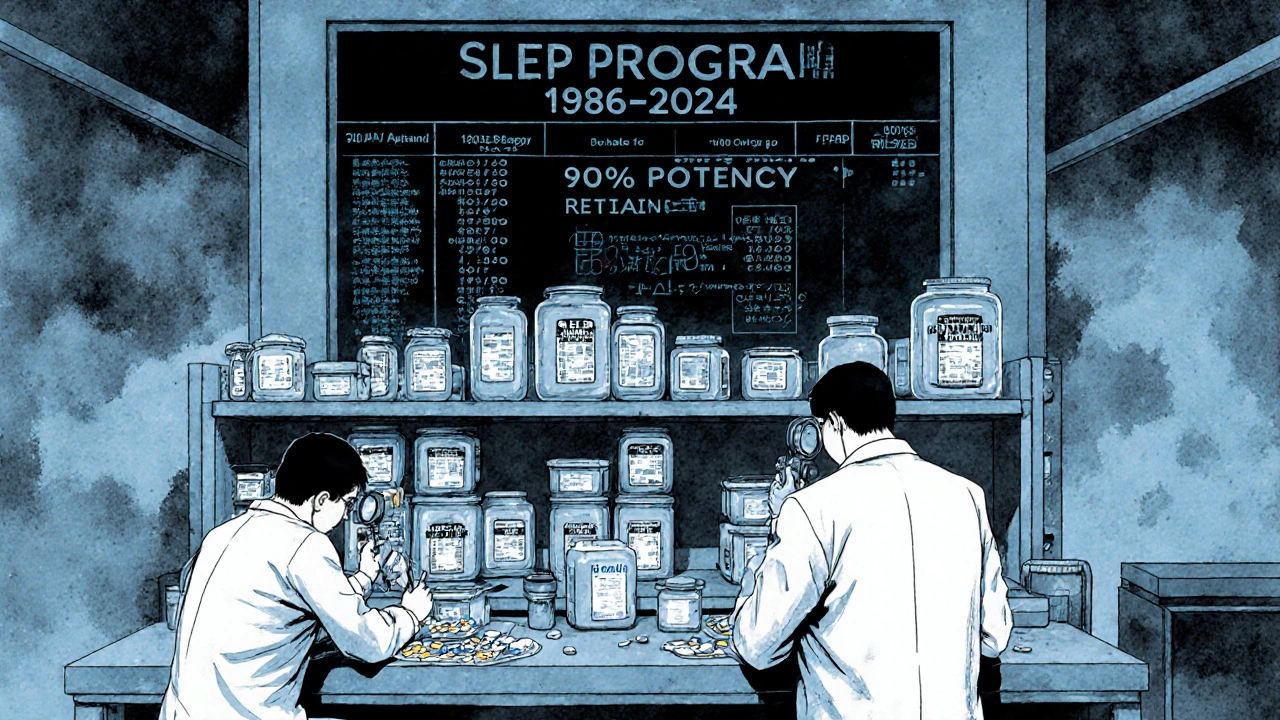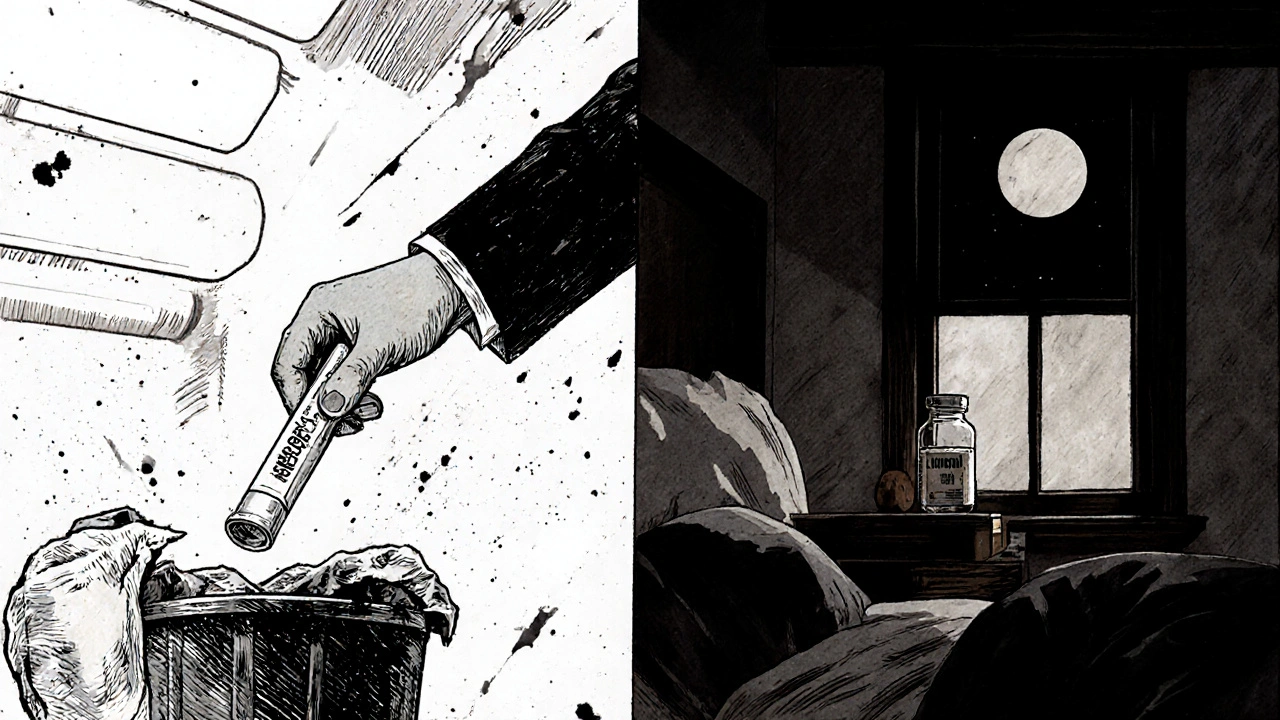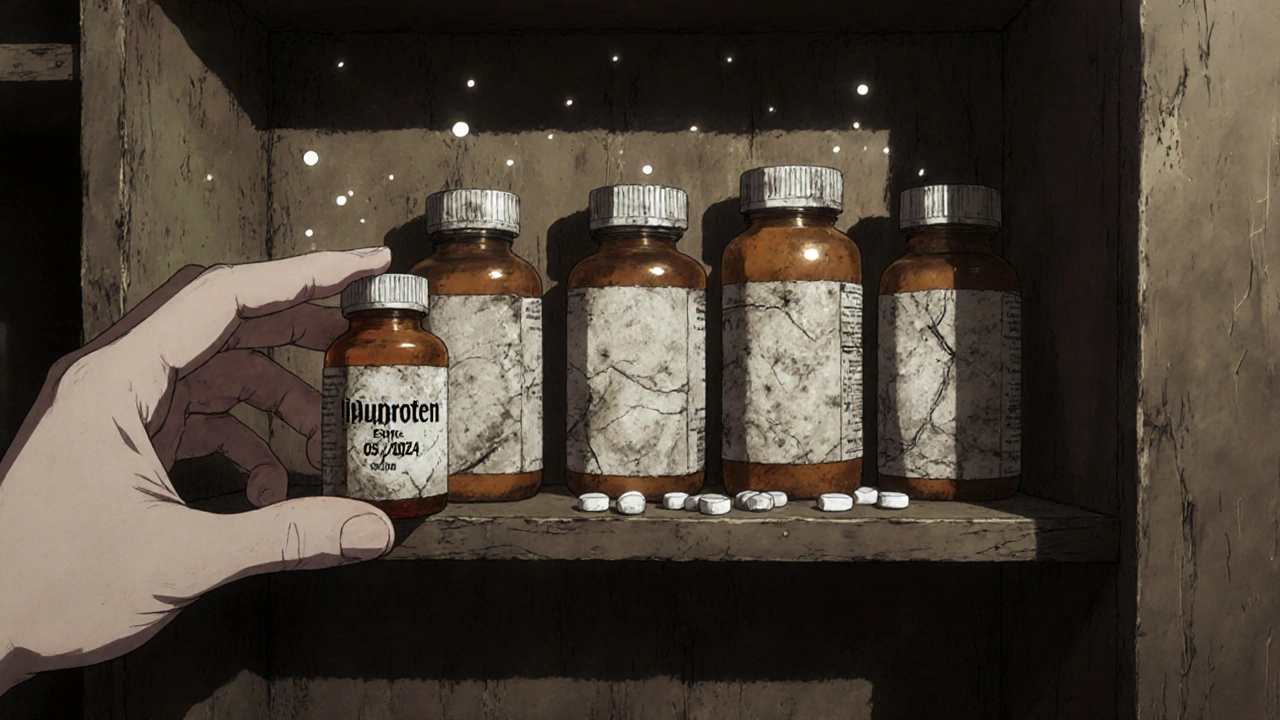Most people toss out medications the moment they hit the expiration date. You see it on the bottle: Exp. 05/2024. You think, That’s it. Gone. Useless. Maybe even dangerous. But what if that’s not true? What if your old ibuprofen, your leftover antibiotics, or even your blood pressure pills are still working-just fine-years after that date?
The truth is, expiration dates aren’t magic deadlines. They’re more like manufacturer guarantees. The FDA requires drugmakers to prove their medications are safe and effective up to that date. But they don’t require testing beyond it. That’s it. No long-term studies. No follow-up. Just a date printed on the label, mostly because the law says so.
Here’s what actually happens after that date: nothing dramatic. Most pills don’t suddenly turn toxic. They don’t explode in your medicine cabinet. They just… slowly lose strength. Like a battery running down.
What the Science Actually Shows
In 2012, researchers from the University of California-San Francisco tested 14 different drugs that had expired 28 to 40 years earlier. These weren’t random samples. They were medications from the U.S. government’s stockpile-stored in perfect conditions: cool, dry, dark. The results? Twelve of the fourteen drugs still had at least 90% of their original potency. Eight of them were still at full strength after 40 years.
That’s not a fluke. The Department of Defense has been running a program called SLEP since 1986. They test expired military drugs-thousands of them. Their findings? 88% of the drugs they tested could have had their expiration dates extended by at least one year. On average, they gained an extra 66 months. One drug stayed potent for over 23 years past its labeled date.
The FDA itself has tested more than 100 drugs. Their data shows about 90% of medications remain safe and effective up to 15 years after expiration-if stored properly.
So why do we still throw them out? Because the expiration date isn’t about when the drug stops working. It’s about when the company stops guaranteeing it.
Which Medications Are Safe? Which Aren’t?
Not all drugs are created equal. Some hold up like tanks. Others? They fall apart fast.
Stable for years past expiration:
- Tablets and capsules: aspirin, ibuprofen, acetaminophen, codeine, hydrocodone, antihistamines, blood pressure meds like lisinopril or metoprolol
- Antibiotics in pill form: amoxicillin, ciprofloxacin (if kept dry and sealed)
- Birth control pills
- Depression and anxiety meds: sertraline, fluoxetine
These forms-solid tablets and capsules-are physically stable. They don’t react easily with air or moisture. As long as they’re kept in their original bottles, away from heat and humidity, they last.
Don’t risk it after expiration:
- Liquid antibiotics (like amoxicillin suspension)
- Insulin
- Nitroglycerin (for chest pain)
- Epinephrine auto-injectors (EpiPens)
- Tetracycline (an old antibiotic that can become toxic)
- Mefloquine (antimalarial)
Why these? Liquids break down faster. Insulin and nitroglycerin are delicate proteins or chemicals that degrade quickly. EpiPens rely on precise pressure and chemical balance-lose even a little potency, and they might not save your life. Tetracycline can break down into substances that damage your kidneys.
Harvard Health and the FDA both warn: if you’re using one of these, don’t gamble. Use a new one.

Storage Matters More Than You Think
Here’s the big secret: how you store your meds matters more than the expiration date.
Think about this: your original pill bottle is sealed tight. It’s designed to keep out moisture, light, and air. But how many people transfer their pills to a pill organizer? Or dump them into a bathroom cabinet where steam rises every morning? Or leave them on a windowsill where the sun beats down?
That’s where degradation happens. A 2006 study found that drugs moved out of their original containers lost potency faster-even if they were still within the expiration date. Moisture is the enemy. Heat is the enemy. Light? Also the enemy.
Keep your meds in their original bottles. Store them in a cool, dry place. A bedroom drawer? Perfect. A bathroom cabinet? Bad. A car glovebox in summer? Absolutely not.
If you’ve already moved your pills into a plastic container, don’t assume they’re still good. Even if the date hasn’t passed, the clock started ticking the moment you opened the original seal.
Why Do Expiration Dates Exist at All?
It’s not science. It’s business.
Drugmakers don’t test their pills for 10, 20, or 30 years. Why? Because it’s expensive. And if they proved a drug lasted 15 years, people would stop buying new ones every year. That cuts into profits.
So they set expiration dates at the longest point they’re willing to guarantee-usually 1 to 5 years after production. The FDA allows this. It doesn’t require longer testing. So the date you see? It’s a legal limit, not a scientific endpoint.
Think of it like a warranty on a toaster. Just because the warranty expires doesn’t mean the toaster stops working. It just means the company won’t fix it if it breaks.
The cost of throwing out perfectly good medicine? In the U.S. alone, it’s billions every year. The DoD’s SLEP program saved taxpayers millions by extending drug lives. Imagine what could happen if this practice became common in pharmacies and homes.

Should You Use Expired Medications?
Let’s be clear: this isn’t a free pass to dig through your junk drawer for last year’s antibiotics.
Use your judgment.
If it’s a non-critical drug-like an old bottle of ibuprofen for a headache-and it looks fine (no discoloration, no weird smell, no crumbling), it’s likely still safe and effective. You won’t get full strength, but you’ll probably get enough.
But if it’s something life-saving? Insulin? EpiPen? Nitroglycerin? Don’t risk it. Buy a new one. Even if it’s $50. It’s worth it.
For chronic conditions-blood pressure, thyroid, heart meds-don’t play around. If your prescription is expired, refill it. Your health isn’t a gamble.
And if you’re unsure? Call your pharmacist. They’ve seen it all. They can tell you if your old meds are likely still good-or if you should toss them.
The Bottom Line
Most expired medications aren’t dangerous. They’re just weaker. And many are still perfectly usable-years after the date on the bottle.
The real danger isn’t taking an old pill. It’s assuming every expired drug is useless. Or worse, assuming every one is safe.
Know the difference. Know your meds. Know how they’re stored. And when in doubt, especially with critical drugs, get a new one.
Expiration dates are a starting point-not an ending. The science says so. The data says so. And your wallet might thank you for it.


Kihya Beitz
November 15, 2025 AT 17:42So let me get this straight-we’re supposed to trust a pill from 2007 because some government lab stored it in a fridge like a museum piece? Meanwhile my ibuprofen’s been in a sweaty gym bag since last winter and I still take it like it’s a goddamn sacrament. 🤡
Jennifer Walton
November 17, 2025 AT 12:12Expiration dates are social constructs. The body doesn’t read labels. It reads chemistry.
Andrew Eppich
November 18, 2025 AT 10:08While I appreciate the anecdotal data, we must remember that pharmaceutical efficacy is not a matter of personal discretion. Regulatory standards exist for public safety. Relying on expired medication is irresponsible and potentially dangerous.
Hollis Hollywood
November 20, 2025 AT 05:38I’ve got a bottle of amoxicillin from 2018 that I kept in the original bottle, in a dark drawer, never opened. I’m not gonna lie-I’ve thought about using it when my kid got sick and the pharmacy was closed. I didn’t. But I also didn’t toss it. I just… kept it. Like a relic. Like a promise. Maybe one day I’ll need it. Maybe I won’t. But I think we’ve lost something in how we treat medicine now. We treat it like trash instead of something sacred. I don’t know. Maybe I’m just old-fashioned.
Aidan McCord-Amasis
November 21, 2025 AT 07:59So basically: if it’s not insulin, just chuck it in your pocket and hope for the best. 🤷♂️💊
Katie Baker
November 21, 2025 AT 08:15This actually made me feel way better about that old bottle of sertraline I’ve been holding onto. I keep it in the closet, dry and dark. If it helps me sleep better, why not? I’m not hurting anyone.
John Foster
November 23, 2025 AT 05:30There’s a quiet rebellion in keeping medicine past its date. A refusal to participate in the capitalist churn of perpetual consumption. The pharmaceutical industry doesn’t want you to know that a $3 pill can last 15 years. They want you to buy a new one every 6 months. They want you dependent. They want you afraid. And now you’re afraid of your own medicine. That’s the real tragedy here.
Edward Ward
November 24, 2025 AT 07:06It’s fascinating how much of this hinges on storage conditions-moisture, heat, light-and yet, we treat medicine like it’s a disposable consumer good. The original bottle isn’t just packaging; it’s a controlled environment. Once you transfer it, you’re essentially removing its protective layer. That’s why the 2006 study showed degradation even before expiration. It’s not the date-it’s the exposure. And yet, we blame the date. We’re so good at blaming the wrong thing.
Jessica Chambers
November 24, 2025 AT 15:56My pharmacist laughed when I asked about my 2019 blood pressure pills. Said, 'Honey, if it looks like a rock and smells like nothing, it’s probably fine.' 😏
Shyamal Spadoni
November 24, 2025 AT 23:57you think this is about science? nah. its about the deep state and big pharma controlling the masses. they dont want you to know you can live on expired meds for decades. they want you addicted to pills and bills. the fda is in on it. the doD has been doing this since the cold war and they never told you. why? because if you knew you could survive on 20 year old antibiotics you wouldnt need doctors. you wouldnt need hospitals. you wouldnt need the system. and they cant have that. they need you weak. they need you scared. they need you buying new bottles every year like a good little sheep. the truth is out there. just dont look in the medicine cabinet.
Ogonna Igbo
November 26, 2025 AT 02:26In Nigeria we don't waste medicine. If it's not liquid and not tetracycline, we use it. We know the difference. You in America throw away life because of a date. You have money so you think you have control. We know better. Medicine is not a luxury. It's survival. Your expiration dates are your privilege.
BABA SABKA
November 28, 2025 AT 02:25Let’s not romanticize this. The DoD has a billion-dollar budget and climate-controlled vaults. Your bathroom cabinet is not a military storage facility. You’re not a lab technician. You’re just a guy who left his Advil next to the shower. The data you’re citing? Irrelevant to real-world conditions. You’re cherry-picking to justify laziness.
Chris Bryan
November 28, 2025 AT 13:41So you're telling me I should risk my life because some government experiment in a lab says it's okay? That's not science. That's a cult. And you're the prophet. Wake up. This is how people die. You think you're smart? You're just stupid and lucky.
Jonathan Dobey
November 29, 2025 AT 18:49The expiration date is a capitalist incantation-a spell cast by corporate priests to keep the faithful returning to the temple of the pharmacy. The pill doesn’t care about your calendar. It remembers its chemistry. It remembers its purity. It remembers the silence of the sealed bottle. But you? You’ve been conditioned to fear the ink on the label like it’s a curse from the gods of profit. The real poison isn’t in the tablet. It’s in the belief that you need to buy again.
ASHISH TURAN
December 1, 2025 AT 16:19I’ve kept my mom’s old metoprolol for 7 years. It’s in the original bottle, in a drawer. No moisture, no sun. She’s fine. I asked a pharmacist. He said, 'If it looks and smells normal, it’s probably still working.' Not a guarantee. But not a gamble either. Use common sense. Not fear.